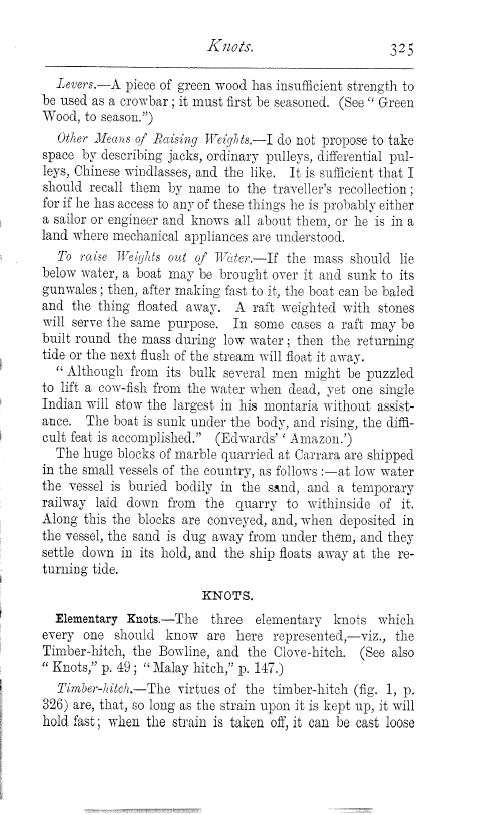Knots. 32~
Levers.-A piece of green wood has insufficient strength to be used as a crowbar ; it must first be seasoned. (See " Green \Vood, to season.")
Other Means of Raising Weights.-I do not propose to take space by describing jacks, ordinary pulleys, differential pulleys, Chinese windlasses, and the like. It is sufficient that I should recall them by name to the traveller's recollection ; for if he has access to any of these things he is probably either a sailor or engineer and knows all about them, or he is in a land where mechanical appliances are understood.
To raise JVeights out of tic titer.-If the mass should lie below water, a boat may be brought over it and sunk to its gunwales ; then, after making fast to it, the boat can be baled and the thing floated away. A raft weighted with stones will serve the same purpose. In some cases a raft may be built round the mass during low water ; then the returning tide or the next flush of the stream will float it away.
" Although from its bulk several men might be puzzled to lift a cow-fish from the water when dead, yet one single Indian will stow the largest in his montaria without assistance. The boat is stink under the body, and rising, the difficult feat is accomplished." (Edwards' ' Amazon.')
The huge blocks of marble quarried at Carrara are shipped in the small vessels of the country, as follows:-at low water the vessel is buried bodily in the sand, and a temporary railway laid down from the quarry to withinside of it. Along this the blocks are conveyed, and, when deposited in the vessel, the sand is dug away from under them, and they settle down in its hold, and the ship floats away at the returning tide.
KNOTS.
Elementary Knots.-The three elementary knots which every one should know are here represented,-viz., the Timber-hitch, the Bowline, and the Clove-hitch. (See also " Knots," p. 49; " Malay hitch," p. 147.)
Timber-hitch.-The virtues of the timber-hitch (fig. 1, p. 326) are, that, so long as the strain upon it is kept up, it will hold. fast; when the strain is taken off, it can be cast loose

